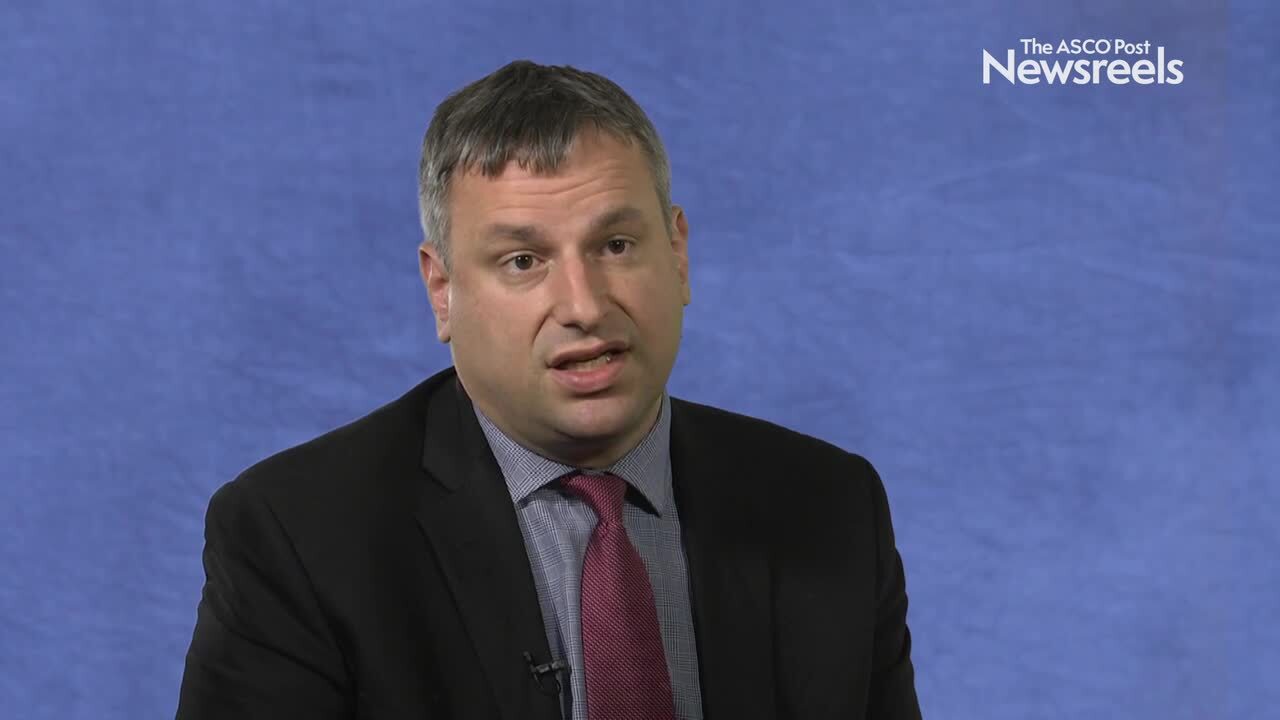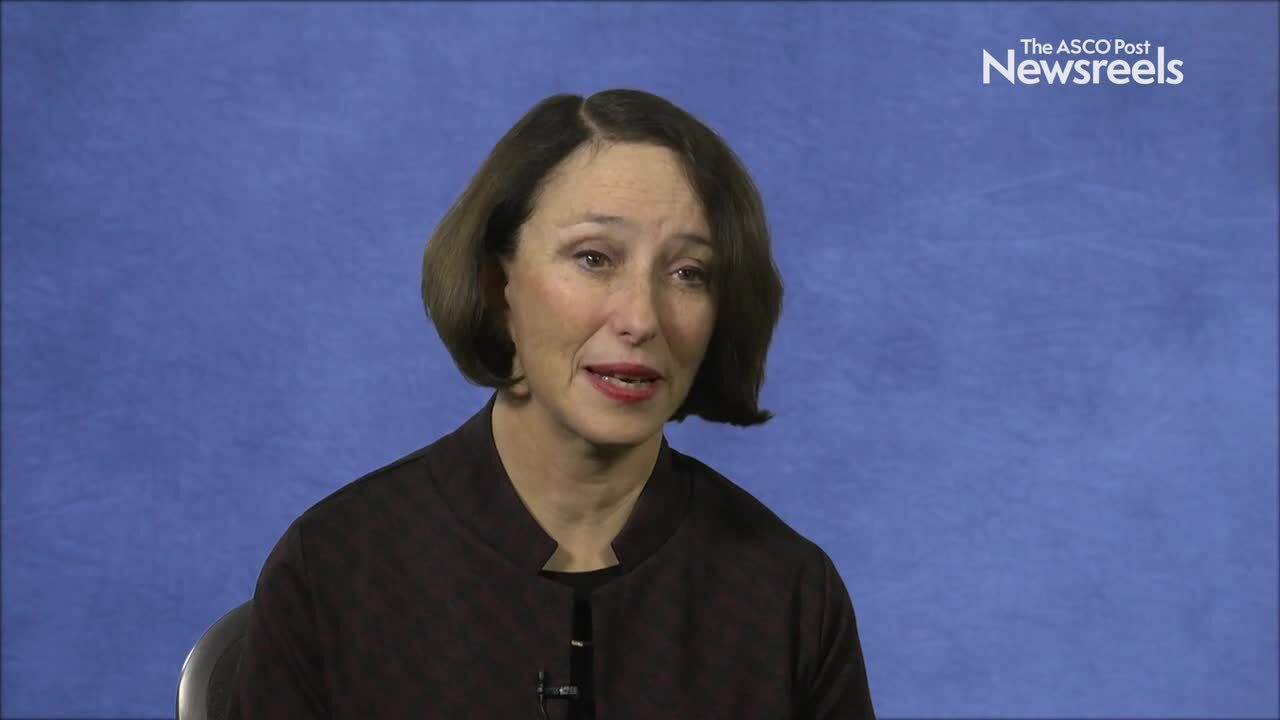FDA Approves Selpercatinib for Lung and Thyroid Cancers With RET Mutations or Fusions
On May 8, 2020, the U.S. Food and Drug Administration (FDA) granted accelerated approval to selpercatinib (Retevmo) for the following indications: Adult patients with metastatic RET fusion–positive non–small cell lung cancer (NSCLC) Adult and pediatric patients ≥ 12 years of age with advanced or...
Joint Guideline Sheds Light on Management of Hereditary Breast Cancer
As germline genetic testing becomes more widespread among patients with breast cancer, recommendations for the appropriate management of patients with hereditary breast cancer are needed. Until now, no ASCO guideline has addressed the management of hereditary breast cancer, even for carriers of...
AACR 2020: Cell-Free DNA Liquid Biopsy May Provide an Early Detection Test for Patients With Suspected Cancer
The Circulating Cell-free Genome Atlas Study is a large multicenter, case-controlled, observational study of 15,254 participants, 56% with cancer and 44% without cancer, with longitudinal follow-up to support the development of a cell-free DNA (cfDNA) multicancer early detection test. In this phase ...
How CRISPR-Cas9 Gene Editing May Improve the Effectiveness of Cellular Therapeutics in Patients With Cancer
The results from the first in-human phase I clinical trial in the United States evaluating CRISPR-Cas9–edited T cells in patients with advanced cancer has shown that the therapy is both feasible and safe, representing a big step forward in the potential of using gene editing to boost the natural...
Should Restrictions on Genetic Testing Be Loosened?
The loosening of restrictions on genetic testing would mean that all health-care providers could help move this needle to where it should be, according to Kevin S. Hughes, MD, a surgeon at Massachusetts General Hospital, Professor of Surgery at Harvard Medical School, and Medical Director of the...
Methylation Signatures From Sequencing Circulating Cell-Free DNA Detected Different Types of Cancer Across Multiple Stages
Researchers have developed the first blood test that can accurately detect more than 50 types of cancer and identify in which tissue the cancer originated—often before there are any clinical signs or symptoms of the disease. These findings were published by Liu et al in Annals of Oncology. In their ...
First-in-Human Study of RAF Family Kinase Inhibitor Lifirafenib in Solid Tumors
In a first-in-human phase I trial reported in the Journal of Clinical Oncology, Desai et al found that the RAF family kinase inhibitor lifirafenib produced responses in several solid tumor types in patients with BRAF or KRAS/NRAS mutations. Study Details The study, conducted in Australia and New...
International Uptake of Molecular Testing Across Tumor Types: Analysis of Eight Countries
In a study reported in JCO Oncology Practice, Chambers et al found that use of molecular testing across tumor types often varied widely in several countries, sometimes reflecting regional differences in the incidence of cancer types. Study Details The study involved the use of aggregated results of ...
Genetic Counseling and Testing of Patients With Pancreatic Cancer
Routine genetic counseling and multigene testing of patients with pancreatic cancer result in the detection of mutations that are actionable, not only for patients, but also for at-risk family members. At the Dana-Farber Cancer Institute in Boston, the use of a systemized, automated referral system ...
Association of Germline Variant Status and Response to Neoadjuvant Chemotherapy in High-Risk Early Breast Cancer
In a study of the GeparOcto trial population reported in JAMA Oncology, Pohl-Rescigno et al found that presence of germline BRCA1/2 variants was associated with increased rates of complete pathologic response (pCR) to neoadjuvant chemotherapy in women with high-risk early breast cancer, and that a...
Evaluation of Genetic Testing in NCCN Criteria for Women With Breast Cancer
In a single-institution study reported in the Journal of Clinical Oncology, Yadav et al found that many women with breast cancer with germline pathogenic genetic variants do not qualify for genetic testing on current National Comprehensive Cancer Network® (NCCN®) hereditary testing criteria....
Avapritinib for Gastrointestinal Stromal Tumor With PDGFRA Exon 18 Mutation
On January 9, 2020, avapritinib was approved for treatment of adults with unresectable or metastatic gastrointestinal stromal tumors (GIST) harboring a platelet-derived growth factor receptor alpha (PDGFRA) exon 18 mutation, including D842V mutations.1,2 It is the first therapy approved for...
Geographic and Racial Variability in Germline BRCA Mutation Prevalence Among Patients With Metastatic Pancreatic Cancer
In a study reported in the Journal of Clinical Oncology, Talia Golan, MD, and colleagues identified geographic and ethnic heterogeneity of germline BRCA1/2 mutation prevalence among patients screened for entry into the phase III POLO trial, which examined the efficacy of olaparib maintenance...
Automated Referral Process for Genetic Counseling and Testing of Patients With Pancreatic Cancer
Routine genetic counseling and multigene testing of patients with pancreatic cancer result in the detection of mutations that are actionable, not only for patients, but also for at-risk family members. At the Dana-Farber Cancer Institute, the use of a systemized, automated referral system that does ...
New ASCO Guideline Highlights Need to Improve Germline, Somatic Tumor Testing in Epithelial Ovarian Cancer
A new ASCO clinical practice guideline provides clinicians and other health-care professionals with evidence-based recommendations on genetic and tumor testing for women diagnosed with epithelial ovarian cancer.1 “We wanted to go over the evidence and make strong statements and recommendations...
Neoadjuvant Cisplatin for BRCA-Mutation Carriers: Pruning the Dead Branches
At the 2019 San Antonio Breast Cancer Symposium, Nadine Tung, MD, of Beth Israel Deaconess Medical Center, presented a multisite study called INFORM, run by the Translational Breast Cancer Research Consortium.1 It compared single-agent cisplatin with a “classic” combination of doxorubicin and...
Genetic Mutations in Donor Stem Cells May Affect Hematopoietic Transplant Recipients
A new study on hematopoietic stem cell transplantation from Washington University School of Medicine in St. Louis suggests that extremely rare, harmful genetic mutations present in healthy donors’ stem cells—though not causing health problems in the donors—may be passed on to patients with cancer...
Study Finds Women With Variants in Breast Cancer–Associated Genes May Not Always Be Receiving Guideline-Concordant Care
Women with early-stage breast cancer who test positive for an inherited genetic variant are not always receiving cancer treatment that follows current treatment guidelines, according to findings from a new study published by Allison W. Kurian, MD, MSc, and colleagues in JAMA Oncology. An inherited ...
CMS Expands Coverage of Next-Generation Sequencing for Patients With Breast or Ovarian Cancer
On January 27, the Centers for Medicare & Medicaid Services (CMS) took action to cover U.S. Food and Drug Administration–approved or –cleared laboratory diagnostic tests using next-generation sequencing (NGS) for patients with germline ovarian or breast cancer. Over the last several years, CMS ...
2020 GI Cancers Symposium: Data From Colorectal Cancer Cohorts of TAPUR Study Presented
Positive findings from three Targeted Agent and Profiling Utilization Registry (TAPUR) study cohorts on the potential benefit of various molecularly targeted drugs in patients with advanced colorectal cancer were presented at the 2020 Gastrointestinal Cancers Symposium. The TAPUR study is the first ...
Genomic Aberrations and Pancreatic Cancer Subtypes
Researchers have discovered detailed new genetic information about the subtypes of pancreatic cancer. A better understanding of the disease groups may lead to new treatment options and improved clinical outcomes for this lethal disease, Chan-Seng-Yue et al reported in Nature Genetics. The study...
Entrectinib in Advanced or Metastatic NTRK Fusion–Positive Solid Tumors
As reported in The Lancet Oncology by George D. Demetri, MD, and colleagues, integrated analysis of three phase I/II trials has shown high levels of activity of the tropomyosin receptor kinase (TRK) inhibitor entrectinib in advanced NTRK fusion–positive solid tumors. This analysis supported the...
Treatment of Advanced Esophagogastric Cancer According to ERCC1 Expression
As reported in the Journal of Clinical Oncology by Iqbal and colleagues, the phase II SWOG S1201 trial showed a progression-free survival benefit with platinum-containing vs nonplatinum treatment among all patients with previously untreated HER2-negative advanced esophagogastric cancer and in a...
A Systematic Approach to Identifying the Molecular Factors That Lead to Cancer Progression
Although gene mutations are the primary drivers of carcinogenesis, an array of complex and tumor-specific molecular interaction networks determine cancer cell behavior. To learn more about this line of inquiry, The ASCO Post recently spoke with Andrea Califano, Dr., Professor of Chemical Biology...
Belinda Kingston, MB ChB, on the Genomic Landscape of Breast Cancer Based on ctDNA Analysis
Belinda Kingston, MB ChB, of the Institute of Cancer Research London, discusses next-generation sequencing results from the plasmaMATCH trial, including the incidence of gene alterations overall, as well as the associations with clinical and pathologic features that may help direct treatment decisions (Abstract GS3-07).
Nicholas C. Turner, MD, PhD, on ctDNA Testing to Direct Targeted Therapies in Advanced Breast Cancer
Nicholas C. Turner, MD, PhD, of The Royal Marsden NHS Foundation Trust, discusses findings from the plasmaMATCH trial, which showed that circulating tumor DNA testing offers accurate tumor genotyping to identify patients with rare HER2 and AKT1 mutations and may enable matching them with targeted treatments (Abstract GS3-06).
Ilaria Iacobucci, PhD, on AML and MDS: Moving Beyond Gene Panel–Based Classifications
Ilaria Iacobucci, PhD, of St. Jude Children’s Research Hospital, discusses her work to more accurately define mutation subtypes in acute myeloid leukemia and myelodysplastic syndromes, as well as the implications for diagnosis, prognosis, and treatment (Abstract LBA-4 ).
ASH 2019: Genomic Features of AML in Patients Aged 60 or Older May Predict Stem Cell Transplant Outcome
For older patients with acute myeloid leukemia (AML), the prospects for success of a stem cell transplant can often be predicted based on the particular set of leukemic genetic characteristics, according to results presented by Murdock et al at the 2019 American Society of Hematology (ASH) Annual...
FDA Pipeline: Recent Designations in Hepatocellular Carcinoma, Cholangiocarcioma, Lymphoma, and More
Over the past few weeks, the U.S. Food and Drug Administration (FDA) granted reviews or designations to treatments for gastrointestinal cancers and lymphoma, and also provided authorizations for products designed to screen for malignancies and tumor mutational burden. Priority Review for Nivolumab...
Factors in Genetic Testing Decisions Among Women With a Personal and Family History of Breast Cancer
In a study reported in the Journal of Oncology Practice, Scott et al identified several factors that motivated breast cancer survivors with high genetic risk to undergo genetic testing and found that clinicians often failed to discuss all relevant factors in decision-making. Study Details The...
Gene Signature to Identify Benefit of Front-Line Fludarabine, Cyclophosphamide, and Rituximab in IGHV-Unmutated CLL
In a retrospective cohort study reported in The Lancet Oncology, Herling et al identified a 17-gene signature that distinguished patients with IGHV-unmutated chronic lymphocytic leukemia (CLL) more likely to achieve long-term remission after front-line chemoimmunotherapy with fludarabine,...
BRAF and MEK Inhibition in Advanced Melanoma With Rare BRAF Mutations
In a study reported in the Journal of Clinical Oncology, Menzer et al found that combined BRAF/MEK inhibitor therapy appeared to be more active than single-inhibitor therapy in advanced melanoma with rare BRAF mutations. Study Details The study involved data from 103 patients with advanced melanoma ...
ASCO Breakthrough: Breast Cancer Gene-Expression Signature May Help Predict Recurrence Postradiotherapy
Researchers have identified a gene pattern that may help predict which patients with breast cancer will have early or late disease recurrence following radiation therapy. The ability to predict the timing of recurrence could change—and improve—treatment strategies and determine the length of...
ASCO Breakthrough: Effect of ATM Mutations on Response to Radiotherapy
Somatic mutations of DNA damage repair genes like ATM and BRCA1 or BRCA2 may result in poor disease prognosis and chemotherapy resistance. However, a study by Lee et al presented at ASCO Breakthrough: A Global Summit for Oncology Innovators (Abstract 130) investigated the possibility that these...
Patients With Metastatic Colorectal Cancer Carrying Class 3 BRAF Mutations May Respond to Anti-EGFR Therapy
Although between 8% and 12% of patients with metastatic colorectal cancer harbor a BRAF gene mutation, not all non-V600 BRAF alterations respond to EGFR antibody treatment, according to findings from a study by Yaeger et al published in Clinical Cancer Research. The study investigated whether...
POLE/POLD1 Mutations Across Cancer Types and Association With Immune Checkpoint Inhibitor Therapy Outcomes
In a research letter published in JAMA Oncology, Wang et al identified the frequency of mutations in DNA polymerase epsilon (POLE) and delta 1 (POLD1) genes across cancer types and found that these mutations were associated with better survival outcomes among patients receiving immune checkpoint...
USPSTF Recommendation on Risk Assessment, Genetic Counseling, and Genetic Testing for BRCA-Related Cancer
As reported in JAMA, the U.S. Preventive Services Task Force (USPSTF) recommended risk assessment and, if indicated, genetic counseling and testing for potentially harmful BRCA1/2 mutations in women with a personal or family history of breast, ovarian, tubal, or peritoneal cancer or who have...
Chromosomal Abnormalities and Prognosis in NPM1-Mutant AML
In a study reported in the Journal of Clinical Oncology, Angenendt et al found that adverse-risk cytogenetics were associated with significantly poorer outcomes vs normal karyotype among patients with acute myeloid leukemia (AML) with a nucleophosmin 1 (NPM1) mutation. As stated by the...
How Technology Is Transforming the Assessment of Inherited Cancer Risk
ASCO published its first statement on genetic testing and its impact on oncology practice over 2 decades ago. Since then, ASCO has revised the statement three times, the most recent in 2015, in response to advances propelled by the sequencing and mapping of the human genome and the identification...
How Laura J. van ’t Veer, PhD, Became an Expert in Genetic Testing for Breast Cancer
Breast cancer researcher and innovator Laura J. van ’t Veer, PhD, was born and reared in Amsterdam in 1957. “During high school, I had a wonderful biology teacher who was going through his own biology studies at the University of Amsterdam, and he was bringing that university-level education into...
Emerging Interest in Metabolic Pathways to Tumorigenesis
Although genetic aberrations are considered a major reason for cancer development, the importance of metabolic alterations in cancer development has emerged as a crucial aspect of contemporary cancer research. Better understanding of the metabolic traits in cancer cells could aid researchers in...
Henry T. Lynch, MD, Trailblazer in Hereditary Cancers, Dies at 91
Henry T. Lynch, MD, widely known as “the father of cancer genetics,” had an early life that could have been lifted from the pages of a Louis L’Amour novel. He dropped out of high school and using a falsified birth certificate joined the U.S. Navy at 16 years old, serving as a gunner on a marine...
Two Pediatric Trials Find Targets for Treatment-Refractory Cancers
An interim analysis of the large Pediatric MATCH trial found that 24% of children and young adolescents with cancers refractory to current treatments had been assigned to treatment with investigational targeted study agents based on genetic alterations detected in their tumors,1 which is more than...
ASCO Clinical Opinion Recommends Germline Testing for All Patients With Pancreatic Cancer
The recently released ASCO Clinical Practice Provisional Clinical Opinion on Evaluating Susceptibility to Pancreatic Cancer highlights the importance of emerging data indicating a relatively high rate of germline mutations in pancreatic cancer.1 Recent studies have demonstrated that up to 1 in 10...
Human Gene Therapy: Progress and Oversight
The early debate over the social and ethical implications of gene therapy led the National Institutes of Health (NIH) to establish the Recombinant DNA Advisory Committee in 1974. However, the risks of human gene therapies were largely unknown until 1999, when a patient died of a massive immune...
American Society of Breast Surgeons Recommends Genetic Testing for Newly Diagnosed Patients With Breast Cancer
IN A MOVE that is a significant departure from current testing recommendations, the American Society of Breast Surgeons (ASBrS) recommends that genetic testing be available to all individuals newly diagnosed with breast cancer.1 The new recommendations expand on common restrictions by the National...
Role of Genomic Profiling in Younger Patients With Cancer
Although overall cancer survival rates continue to improve among all age groups in the United States—there are currently an estimated 15.5 million cancer survivors, and that number is expected to increase to 20.3 million by 20261—survival rates for adolescents and young adults with cancer (AYAs)...
Dejan Juric, MD, on Advanced Breast Cancer: Results From the SOLAR-1 Trial
Dejan Juric, MD, of Massachusetts General Hospital, discusses phase III study findings on liquid biopsy–based assessment of PIK3CA mutational status and the combination of the selective PI3K-alpha inhibitor alpelisib plus fulvestrant in the treatment of advanced breast cancer (Abstract GS3-08).
Judy E. Garber, MD, on Cancer Genetics: Updates for Breast Cancer Care
Judy E. Garber, MD, of the Dana-Farber Cancer Institute, summarizes a special session she moderated, which included discussion of polygenic risk scores, genetic testing in diverse populations, and what to do when presented with moderate-penetrance mutations.
Patient-Partnered Research: Focal Point of New Collaborative Effort in Cancer Genetics
Researchers, patients with cancer, and philanthropists have come together to launch Count Me In, a nonprofit organization aimed at patient-partnered research. Count Me In allows patients with cancer anywhere in the United States or Canada to easily share their medical information, personal...





